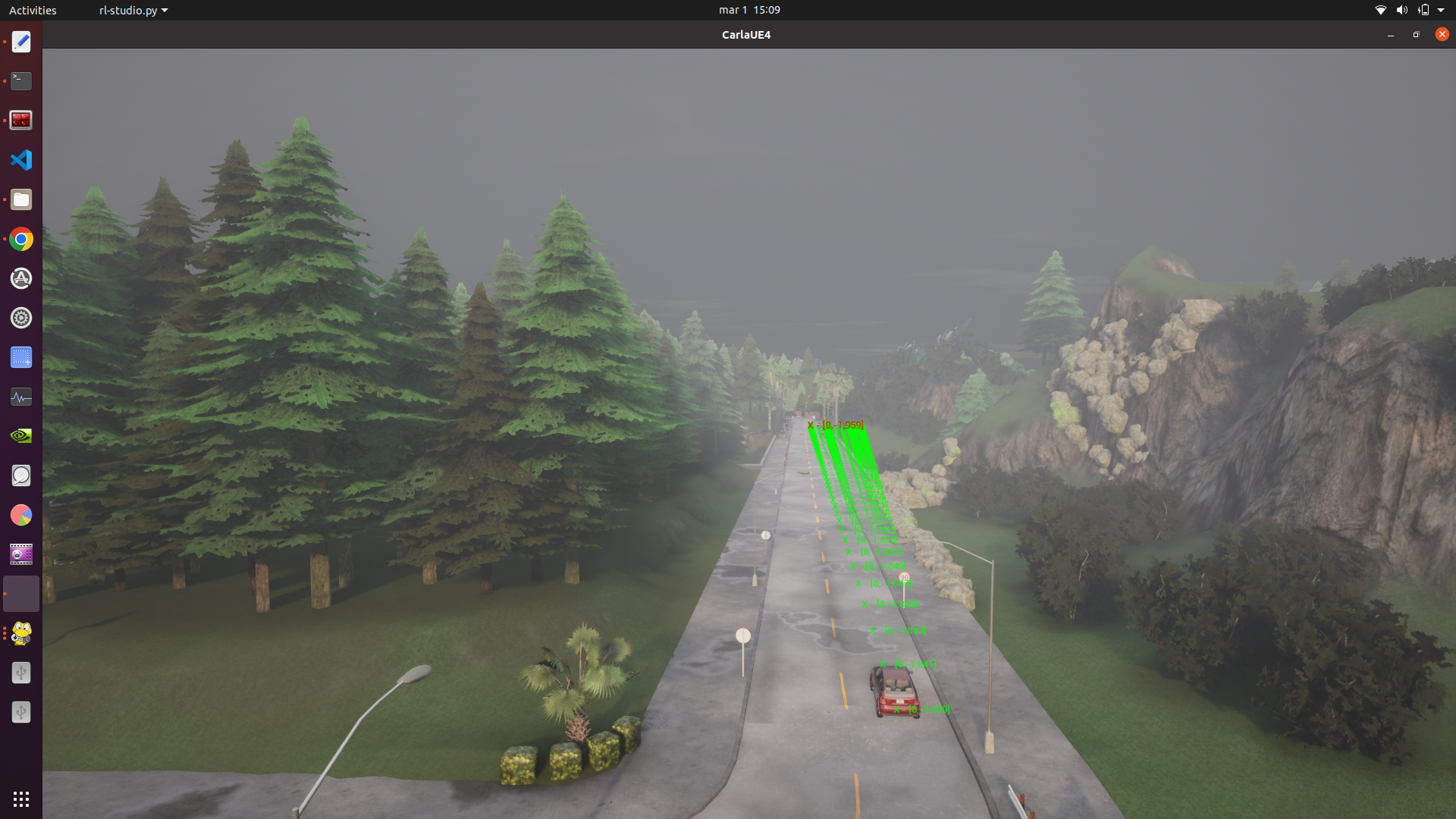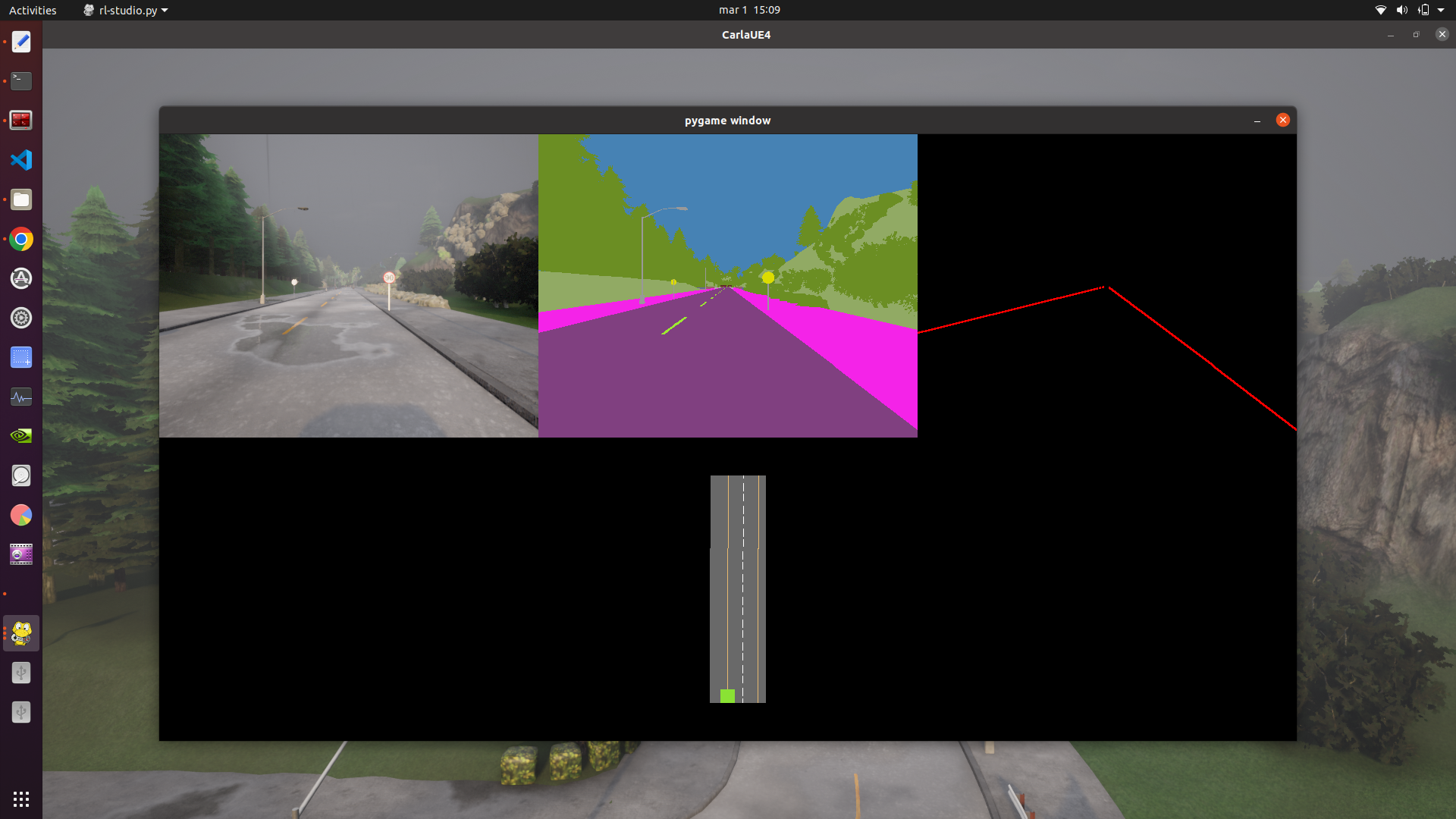Reinforcement Learning Studio, RL-Studio, is a platform for developing robotic applications with reinforcement learning algorithms. Its modular design allows to work easily with different agents and algoritmhs in autonomous tasks and any simulator.
RL-Studio is designed to work with robots, as autonomous vehicles, in any relevant tasks with any simulators that provide adequate realism to transfer development to real environments automatically and with robustness --sim2real transfer. The designed agents can support any type of sensor that collects information from the environment and, with reinforcement learning algorithms, can send correct signals to the actuators to adequately command the robot, following the standard reinforcement learning cycle.
Rl-Studio allows you to work with different modes of operation, all of them neccesary to build a RL app:
- Training: the objective of any development in RL-Studio is to design a training that generates a suitable model for the environment in question. see diagram
- Retraining of models already generated, so that they continue learning in the same or different environments.
- Inference: Trained models are tested --inference -- in different environments in order to validate their learning.
RL-Studio is designed to work with any robotic agent, mainly in autonomous driving through complex environments. However, thanks to the modularity of the application, it is easy to create new agents that are tested in other tasks, such as manipulation, legged robots, drones and so on.
Qlearn, DQN, DDPG and PPO have currently been implemented to work on the different tasks developed. However, it is easy to design any other algorithms.
Tensorflow 2.9.11 and Pytorch 1.13 are currently supported, although it is very easy to extend to others.
RL-Studio supports ROS Noetic which is necesary to interact with Gazebo or also as a bridge with Carla. Although Carla can work without ROS also. Currently there are working canonical reinforcement lerning tasks with OpenAI simulator through gymnasium library.
RL-Studio works with ROS Noetic. You can install ROS Noetic from the official documentation and installing ROS Noetic Full Desktop.
git clone git@github.com:JdeRobot/RL-Studio.gitor
git clone https://github.com/JdeRobot/RL-Studio.gitIt is highly recommended to create a virtual environment:
cd RL-Studio
pip install -r requirements.txtAdd the project to PYTHONPATH:
echo "export PYTHONPATH=$PYTHONPATH:~/PATH/TO/RL-Studio" >> ~/.bashrc
source ~/.bashrcThe commits follow the gitmoji convention and the code is formatted with Black.
 If you want to work with Carla Simulator, you need to install
If you want to work with Carla Simulator, you need to install
- Carla v. 0.9.13
- ROS Bridge to work with ROS Noetic
- carla-birdeye-view version 1.1.1 to work with birdeye view images. You can install through
pip install --no-deps carla-birdeye-view 1.1.1
The fastest way to verify that the installation has been successful is to follow the next steps.
Be sure your .bashrc has the path to Carla and ROS bridge:
export CARLA_ROOT=$HOME/CARLA_0.9.13
and
source ~/carla-ros-bridge/catkin_ws/devel/setup.bash
Now, you can launch RL-Studio inside your virtual environment:
cd ~/RL-Studio/rl_studio
python rl_studio.py -f config/<file>.yaml
i.e.:
python rl-studio.py -f config/config_training_followlane_qlearn_carla.yaml
To connect RL-Studio with ROS and Gazebo and the different agents and circuits installed:
cd ~/PATH/TO/RL-Studio/rl_studio/installation
bash setup_noetic.bash
⚠️ if bash file execution gives an error, in some configurations can be fixed by editing the bash file and changing the line
catkin_makeby
catkin_make -DPYTHON_EXECUTABLE=/usr/bin/python3 -DPYTHON_INCLUDE_DIR=/usr/include<python3.8>where python3.8 is the actual Python version in your virtual env.
The installation downloads the CustomRobots repository into the above directory, as follows:
CustomRobots/
envs/
installation/
wrappers/The following routes will be added to the .bashrc file:
cd ~/PATH/TO/RL-Studio/rl_studio/CustomRobots/f1/worlds
export GAZEBO_RESOURCE_PATH=$PWDThe final variables to be stored are:
. . .
source /opt/ros/noetic/setup.bash
# Gazebo models
source $HOME/PATH/TO/RL-Studio/rl_studio/installation/catkin_ws/devel/setup.bash
export GAZEBO_MODEL_PATH=$GAZEBO_MODEL_PATH:$HOME/PATH/TO/RL-Studio/rl_studio/installation/catkin_ws/../../CustomRobots/f1/models
export GAZEBO_RESOURCE_PATH=$GAZEBO_RESOURCE_PATH:$HOME/PATH/TO/RL-Studio/rl_studio/CustomRobots/f1/worlds
. . .To set Formula 1 environment run the following script (the same folder that before):
cd ~/PATH/TO/RL-Studio/rl_studio/installation
./formula1_setup.bashThe following routes will be added to the .bashrc file:
. . .
export GYM_GAZEBO_WORLD_CIRCUIT_F1=$HOME/PATH/TO/RL-Studio/rl_studio/installation/../CustomRobots/f1/worlds/simple_circuit.world
export GYM_GAZEBO_WORLD_NURBURGRING_F1=$HOME/PATH/TO/RL-Studio/rl_studio/installation/../CustomRobots/f1/worlds/nurburgring_line.world
export GYM_GAZEBO_WORLD_MONTREAL_F1=$HOME/PATH/TO/RL-Studio/rl_studio/installation/../CustomRobots/f1/worlds/montreal_line.world
. . .There will be as many variables as there are circuits to be executed. In case you want to work with other circuits or agents, there will be necessary add the correct paths to variables in .bashrc file in the same way.
And finally, do not forget adding
export PYTHONPATH=$PYTHONPATH:PATH/TO/RL-StudioTo check that everything is working correctly you can try launching a ROS exercise by typing:
cd /PATH/TO/RL-Studio/rl_studio/CustomRobots/f1/launch
roslaunch simple_circuit.launchand you could see something similar to the screenshot
Additional information on how to create, run and test reinforcement learning models, how to create a configuration file to launch the application and to begin training and inferencing, please go to rl-studio.
Information about coding or naming classes and files, how the directory structure is designed and where to save models, metrics, logs and graphics, please go to codig style file.
FAQ please go to answering questions.
A paper about RL-Studio appears in Volume 590 of the Lecture Notes in Networks and Systems series of Springer and can be cited with bibtex entry:
@inproceedings{fernandez2023rl,
title={RL-Studio: A Tool for Reinforcement Learning Methods in Robotics},
author={Fern{\'a}ndez de Cabo, Pedro and Lucas, Rub{\'e}n and Arranz, Ignacio and Paniego, Sergio and Ca{\~n}as, Jos{\'e} M},
booktitle={Iberian Robotics conference},
pages={502--513},
year={2023},
organization={Springer}
}
or
Fernández de Cabo, P., Lucas, R., Arranz, I., Paniego, S., & Cañas, J. M. (2023). RL-Studio: A Tool for Reinforcement Learning Methods in Robotics. In Iberian Robotics conference (pp. 502-513). Springer, Cham.
Contributions are always welcome!
See CONTRIBUTING for ways to get started.
Please adhere to this project's code of conduct.













